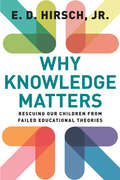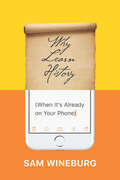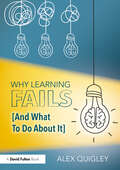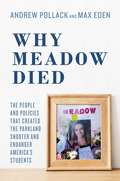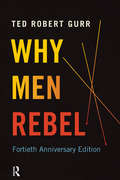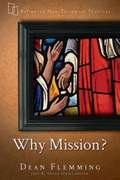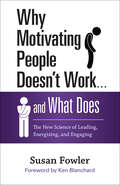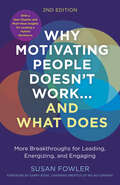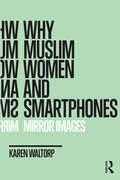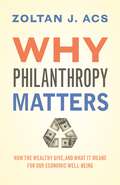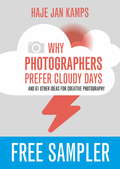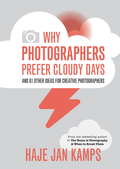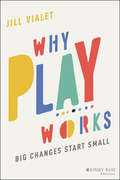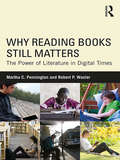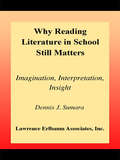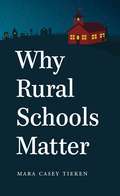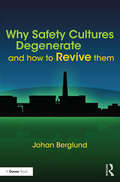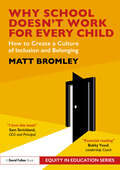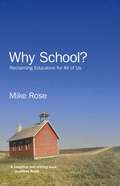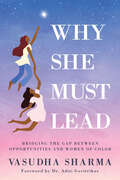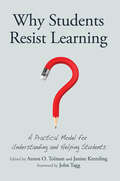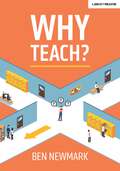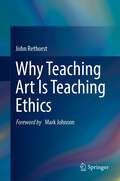- Table View
- List View
Why Knowledge Matters: Rescuing Our Children from Failed Educational Theories
by E. D. Hirsch Jr.In Why Knowledge Matters, influential scholar E. D. Hirsch, Jr., addresses critical issues in contemporary education reform and shows how cherished truisms about education and child development have led to unintended and negative consequences. Hirsch, author of The Knowledge Deficit, draws on recent findings in neuroscience and data from France to provide new evidence for the argument that a carefully planned, knowledge-based elementary curriculum is essential to providing the foundations for children&’s life success and ensuring equal opportunity for students of all backgrounds. In the absence of a clear, common curriculum, Hirsch contends that tests are reduced to measuring skills rather than content, and that students from disadvantaged backgrounds cannot develop the knowledge base to support high achievement. Hirsch advocates for updated policies based on a set of ideas that are consistent with current cognitive science, developmental psychology, and social science. The book focuses on six persistent problems of recent US education: the over-testing of students; the scapegoating of teachers; the fadeout of preschool gains; the narrowing of the curriculum; the continued achievement gap between demographic groups; and the reliance on standards that are not linked to a rigorous curriculum. Hirsch examines evidence from the United States and other nations that a coherent, knowledge-based approach to schooling has improved both achievement and equity wherever it has been instituted, supporting the argument that the most significant education reform and force for equality of opportunity and greater social cohesion is the reform of fundamental educational ideas.Why Knowledge Matters introduces a new generation of American educators to Hirsch&’s astute and passionate analysis.
Why Learn History (When It’s Already on Your Phone)
by Sam WineburgLet’s start with two truths about our era that are so inescapable as to have become clichés: We are surrounded by more readily available information than ever before. And a huge percentage of it is inaccurate. Some of the bad info is well-meaning but ignorant. Some of it is deliberately deceptive. All of it is pernicious. With the internet always at our fingertips, what’s a teacher of history to do? Sam Wineburg has answers, beginning with this: We definitely can’t stick to the same old read-the-chapter-answer-the-questions-at-the-back snoozefest we’ve subjected students to for decades. If we want to educate citizens who can sift through the mass of information around them and separate fact from fake, we have to explicitly work to give them the necessary critical thinking tools. Historical thinking, Wineburg shows us in Why Learn History (When It’s Already on Your Phone), has nothing to do with test prep–style ability to memorize facts. Instead, it’s an orientation to the world that we can cultivate, one that encourages reasoned skepticism, discourages haste, and counters our tendency to confirm our biases. Wineburg draws on surprising discoveries from an array of research and experiments—including surveys of students, recent attempts to update history curricula, and analyses of how historians, students, and even fact checkers approach online sources—to paint a picture of a dangerously mine-filled landscape, but one that, with care, attention, and awareness, we can all learn to navigate. It’s easy to look around at the public consequences of historical ignorance and despair. Wineburg is here to tell us it doesn’t have to be that way. The future of the past may rest on our screens. But its fate rests in our hands.
Why Learning Fails (And What To Do About It)
by Alex QuigleyIt is a truth universally acknowledged that pupils do not learn all that they are taught. They may learn something, they may even learn a lot, but it may not be a lot of what we think we have taught them or they may struggle to apply knowledge successfully. In this book, bestselling author Alex Quigley characterises how the long and winding road of successful learning is paved with many failures along the way. In presenting eight key reasons why learning fails, alongside concepts from cognitive science and research evidence explained concisely and accessibly, the chapters span issues of pupils’ limited memory, their patchwork prior knowledge, flawed planning, struggles with independent learning, motivation, limits of attention, and more. Each chapter explores real-life examples of key learning failures and what can be done about it, before ending with five steps to success, along with practical teaching strategies and tools that can be used to secure success in every classroom. Packed with practical advice and examples for teachers across all phases at every stage of their teaching career, this book offers a vital guide to support pupils to overcome common barriers to learning and to go on to flourish while challenging the societal stereotypes that see us shy away from failures.
Why Meadow Died: The People and Policies That Created The Parkland Shooter and Endanger America's Students
by Max Eden Andrew PollackThe Parkland school shooting was the most avoidable mass murder in American history. And the policies that made it inevitable are being forced into public schools across America.“After my sister Meadow was murdered at Marjory Stoneman Douglas High School, the media obsessed for months about the type of rifle the killer used. It was all clickbait and politics, not answers or justice. That wasn’t good enough for us. My dad is a real tough guy, but Meadow had him wrapped around her little finger. He would do anything she wanted, and she would want him to find every answer so that this never happens again. My dad teamed up with one of America’s leading education experts to launch his own investigation. We found the answers to the questions the media refused to ask. Questions about school safety that go far beyond the national gun debate. And the answers to those questions matter for parents, teachers, and schoolchildren nationwide. If one single adult in the Broward County school district had made one responsible decision about the Parkland shooter, then my sister would still be alive. But every bad decision they made makes total sense once you understand the district’s politically correct policies, which started here in Broward and have spread to thousands of schools across America.” —Hunter Pollack, “Foreword”
Why Men Rebel
by Ted Robert GurrWhy Men Rebel was first published in 1970 after a decade of political violence across the world. Forty years later, serious conflicts continue in Africa, Asia and the Middle East. Ted Robert Gurr reintroduces us to his landmark work, putting it in context with the research it influenced as well as world events. Why Men Rebel remains highly relevant to today's violent and unstable world with its holistic, people-based understanding of the causes of political protest and rebellion. With its close eye on the politics of group identity, this book provides new insight into contemporary security challenges.
Why Mission? (Reframing New Testament Theology)
by Dean FlemmingRecent years have seen heightened interest in how to read scripturefrom a missional perspective. This book addresses that question byexploring both how the New Testament bears witness to the mission of Godand how it energizes the church to participate in that mission. It alsomakes a distinctive contribution by applying a missional reading to avariety of New Testament books, offering insights into New Testamenttheology and serving today’s discussions about mission and the church."Dean Flemming has written a game-changing book on the interpretationof scripture for the mission of the church. This relatively slim butrich volume is absolutely mandatory reading for all serious students ofthe New Testament and for all who wish to understand the church'sparticipation in the mission of God. It should be on the syllabus ofevery ecclesially focused course on the New Testament and everybiblically attuned course in ecclesiology and in missiology." —Michael J. Gorman, Raymond E. Brown Professor of Biblical Studies and Theology, St. Mary's Seminary and University, Baltimore, MD"I am always grateful when another book by Dean Flemming appears. Hiswriting arises out of his significant cross-cultural experience, hisoutstanding scholarship, and his careful listening to the Spirit in thetext. This book is written clearly and is full of nourishing insight." —Michael W. Goheen, Professor of Missiology, CalvinTheological Seminary, Grand Rapids, MI; former Geneva Chair of WorldviewStudies, Trinity Western University, Langley, BC; and Teaching Fellowin Mission Studies, Regent College, Vancouver, BC "‘Why mission?’ is a critical question, one not asked or understoodoften enough. Here is a stirring reading of the New Testament thatdemonstrates a living triune God on mission, bringing redemption to theworld through a living apostolic church. So much rich theologicalinterpretation packed into a small book!" —Nijay K. Gupta, assistant professor of New Testament, George Fox Evangelical Seminary, Portland, OR"Since writing The Mission of God, I have felt guilty thatit paid so much more attention to a missional reading of the Old than ofthe New Testament. This fine book relieves me of that guilt. This is anoutstandingly clear and faithful exposition of what it means to readthe New Testament from the perspective of, and with the intention ofparticipating in, the mission of God as revealed in the whole Bible." —Christopher J. H. Wright, International Ministries Director, Langham Partnership
Why Motivating People Doesn't Work . . . and What Does: The New Science of Leading, Energizing, and Engaging
by Susan FowlerTop leadership researcher, consultant, and coach Susan Fowler says stop trying to motivate people! It's frustrating for everyone involved and it just doesn't work. You can't motivate people--they are already motivated but generally in superficial and short-term ways. In this book, Fowler builds upon the latest scientific research on the nature of human motivation to lay out a tested model and course of action that will help leaders guide their people toward the kind of motivation that not only increases productivity and engagement but that gives them a profound sense of purpose and fulfillment. Fowler argues that leaders still depend on traditional carrot-and-stick techniques because they haven't understood their alternatives and don't know what skills are necessary to apply the new science of motivation. Her Optimal Motivation process shows leaders how to move people away from dependence on external rewards and help them discover how their jobs can meet the deeper psychological needs--for autonomy, relatedness, and competence--that science tells us result in meaningful and sustainable motivation. Optimal Motivation has been proven in organizations all over the world--Fowler's clients include Microsoft, CVS, NASA, the Catholic Leadership Institute, H&R Block, Mattel, and dozens more. Throughout the book, she illustrates how each step of the process works using real-life examples. Susan Fowler 's book is the groundbreaking answer for leaders who want to get motivation right!
Why Motivating People Doesn't Work…and What Does, Second Edition: More Breakthroughs for Leading, Energizing, and Engaging
by Susan Fowler"Leaders who want to amp up employee morale should take a look.-Publishers WeeklyWhat if the answer to motivating people is to stop trying to motivate them?The second edition of this bestseller reveals how motivation science is essential for solving the most vexing leadership issues-from hybrid work and retention to employee engagement.Leaders face a motivation dilemma. Traditional command-and-control management styles and carrot-and-stick motivation techniques have been proven ineffective.Motivation researcher and leadership consultant Susan Fowler expands on her groundbreaking Spectrum of Motivation model in this updated post-pandemic edition. New chapters tackle motivation science's role in managing remote and hybrid work; expose overused tactics, such as gamification and tokens; and tell the fascinating backstory behind the great resignation and quiet quitting. Fowler's approach to leadership is fresh, pragmatic, and inspiring. But it's also empirically sound. Her framework builds on Self-Determination Theory, equipping leaders with skills to encourage choice, deepen connection, and build competence. Leaders who mastered this method have experienced breakthroughs with higher retention, lower turnover, greater acceptance of DEIJ initiatives, and a more vital, creative, and resilient workforce. Through her experiences working with organizations and leaders around the world, Fowler reminds us that motivation is at the heart of everything people do and everything they don't do but wish they did. When managers integrate motivation science into their everyday leadership practice, an evolutionary truth emerges: people can be highly productive and flourish simultaneously.
Why Muslim Women and Smartphones: Mirror Images (Criminal Practice Ser.)
by Karen WaltorpUsing an assemblage approach to study how Muslim women in Norrebro, Denmark use their phones, Karen Waltorp examines how social media complicates the divide between public and private in relation to a group of people who find this distinction of utmost significance. Building on years of ethnographic fieldwork, Waltorp's ethnography reflects the trust and creativity of her relationships with these women which in turn open up nuanced discussions about both the subject at hand and best practice in conducting anthropological research. Combining rich ethnography with theoretical contextualization, Waltorp's book alternates between ethnography and analysis to illuminate a thoroughly modern community, and reveals the capacity of image-making technology to function as an infrastructure for seeing, thinking and engaging in fieldwork as an anthropologists. Waltorp identifies a series of important issues around anthropological approaches to new media, contributing to new debates around the anthropology of automation, data and self-tracking.
Why Philanthropy Matters: How the Wealthy Give, and What It Means for Our Economic Well-Being
by Zoltan AcsThe hidden role of philanthropy in enriching America's prosperity—and the world'sPhilanthropy has long been a distinctive feature of American culture, but its crucial role in the economic well-being of the nation—and the world—has remained largely unexplored. Why Philanthropy Matters takes an in-depth look at philanthropy as an underappreciated force in capitalism, measures its critical influence on the free-market system, and demonstrates how American philanthropy could serve as a model for the productive reinvestment of wealth in other countries. Factoring in philanthropic cycles that help balance the economy, Zoltan Acs offers a richer picture of capitalism, and a more accurate backdrop for considering policies that would promote the capitalist system for the good of all.Examining the dynamics of American-style capitalism since the eighteenth century, Acs argues that philanthropy achieves three critical outcomes. It deals with the question of what to do with wealth—keep it, tax it, or give it away. It complements government in creating public goods. And, by focusing on education, science, and medicine, philanthropy has a positive effect on economic growth and productivity. Acs describes how individuals such as Benjamin Franklin, Andrew Carnegie, Bill Gates, and Oprah Winfrey have used their wealth to establish institutions and promote knowledge, and Acs shows how philanthropy has given an edge to capitalism by promoting vital forces—like university research—necessary for technological innovation, economic equality, and economic security. Philanthropy also serves as a guide for countries with less flexible capitalist institutions, and Acs makes the case for a larger, global philanthropic culture.Providing a new perspective on the development of capitalism, Why Philanthropy Matters highlights philanthropy's critical links to the economic progress, health, and future of the United States—and beyond.
Why Photographers Prefer Cloudy Days: Surprising And Inspiring Tips For Photographers
by Haje Jan Kamps**FREE SAMPLER** There's no one secret to taking beautiful photos, but good photographers build up a series of useful bits of know-how. They know that clouds, far from ruining a photo, give a great soft natural light for portraits. They know that unusual angles draw the eye, and that their feet are just as effective as a zoom lens.This book packs 62 of the most important creative ideas into one easy-to-read location, beautifully presented with example photos. None of these ideas need an expensive camera, fancy lens or a over-priced flash. The purpose of this book is to help you tell stories with your camera, whatever the camera.Whether you're photographing that perfect sunset or your morning coffee, Why Photographers Prefer Cloudy Days will show you how to capture it to best effect, whether you want it to look great on your Instagram, or amazing on your wall.
Why Photographers Prefer Cloudy Days: Surprising And Inspiring Tips For Photographers
by Haje Jan KampsThere's no one secret to taking beautiful photos. But good photographers do have a few tricks up theirsleeves... They know that clouds, far from ruining a photo, give a great soft natural light for portraits. They know that unusual angles draw the eye, and that their feet are just as effective as a zoom lens.This book packs 62 of the most important creative ideas into one place. Beautifully presented, easy-to-read and packed with example photos. None of these ideas need an expensive camera, fancy lens or a over-priced flash. The purpose of this book is to help you tell stories with your camera (or phone).Whatever you want to shoot, Why Photographers Prefer Cloudy Days is packed full of ideas to inspire you, and tips that will help you take better, more original photos.
Why Photographers Prefer Cloudy Days: and 61 Other Ideas for Creative Photography
by Haje Jan KampsThere's no one secret to taking beautiful photos. But good photographers do have a few tricks up theirsleeves... They know that clouds, far from ruining a photo, give a great soft natural light for portraits. They know that unusual angles draw the eye, and that their feet are just as effective as a zoom lens.This book packs 62 of the most important creative ideas into one place. Beautifully presented, easy-to-read and packed with example photos. None of these ideas need an expensive camera, fancy lens or a over-priced flash. The purpose of this book is to help you tell stories with your camera (or phone).Whatever you want to shoot, Why Photographers Prefer Cloudy Days is packed full of ideas to inspire you, and tips that will help you take better, more original photos.
Why Play Works: Big Changes Start Small
by Jill VialetHarness the power of play in building learning environments that help students thrive In Why Play Works, expert educator and author Jill Vialet shares her insights from a career of promoting play. Designed to support schools, education professionals and parents in promoting play as an essential tool for increasing social connection amongst their students, you'll find out why playing is a behavior that's helped children learn to navigate the demands of social interaction for eons, and how we can keep it central to their school experience even as we return from the COVID-19 pandemic. In this book, you'll discover: Why it's important to intentionally integrate play into day-to-day school operations because of its ability to help students learn to manage risks, develop greater self awareness, and build confidence Ways of incorporating play into space – both in-person and remote – that contribute to responsive, flexible and sustainable teaching and learning environments Real examples of schools leveraging play to promote youth leadership and student agency How to incorporate play in co-creating new approaches to education, building off the insight that big changes start small Perfect for educators, school administrators, parents of school-age children, and anyone who is simply play-curious, Why Play Works is intended to prompt your thinking about all the ways in which play can be a tool for helping to bring out the best in our kids.. The book stands out as a thoughtful, playful and effective guide for supporting the learning and well-being of students everywhere.
Why Reading Books Still Matters: The Power of Literature in Digital Times
by Martha C. Pennington Robert P. WaxlerBringing together strands of public discourse about valuing personal achievement at the expense of social values and the impacts of global capitalism, mass media, and digital culture on the lives of children, this book challenges the potential of science and business to solve the world’s problems without a complementary emphasis on social values. The selection of literary works discussed illustrates the power of literature and human arts to instill such values and foster change. The book offers a valuable foundation for the field of literacy education by providing knowledge about the importance of language and literature that educators can use in their own teaching and advocacy work.
Why Reading Literature in School Still Matters: Imagination, Interpretation, Insight
by Dennis J. SumaraWhy Reading Literature in School Still Matters: Imagination, Interpretation, Insight explains how a reader's involvement with literary texts can create conditions for developing deep insight into human experience, and how teachers can develop these interpretive possibilities in school contexts. Developed from the author's many years of research, this book offers both a theoretical framework that draws from an interdisciplinary array of sources and many compelling and insightful examples of literary engagement of child, adolescent, and adult readers, as well as practical advice for teachers and other readers about how to create interesting and expansive sites for interpretation that are personally rewarding and productive. Why Reading Literature in School Still Matters: Imagination, Interpretation, Insight : *provides an overview of theories of human learning that influence beliefs about language, culture, and identity; *shows how these theories of learning influence beliefs about and practices of reading and interpretation; *introduces new ways to conceptualize reading that emphasize the relationship between individual and collective identities and language/literacy practices; *explains why access to information does not guarantee that understanding and/or insight will occur--by emphasizing the importance of "re-reading" and "close reading" this text shows that development of deep insight depends on interpretation skills that must be taught; and *presents a reconceptualized view of reading pedagogy. This is an essential text for education courses at both the undergraduate and graduate levels and a must read for teachers and for anyone interested in more deeply understanding how literary works of art can create conditions for learning about oneself, one's situation, and one's possibilities.
Why Rural Schools Matter
by Mara Casey TiekenFrom headlines to documentaries, urban schools are at the center of current debates about education. From these accounts, one would never know that 51 million Americans live in rural communities and depend on their public schools to meet not only educational but also social and economic needs. For many communities, these schools are the ties that bind. Why Rural Schools Matter shares the untold story of rural education. Drawing upon extensive research in two southern towns, Mara Tieken exposes the complicated ways in which schools shape the racial dynamics of their towns and sustain the communities that surround them. The growing power of the state, however, brings the threat of rural school closure, which jeopardizes the education of children and the future of communities. With a nuanced understanding of the complicated relationship between communities and schools, Tieken warns us that current education policies--which narrow schools' purpose to academic achievement alone--endanger rural America and undermine the potential of a school, whether rural or urban, to sustain a community. Vividly demonstrating the effects of constricted definitions of public education in an era of economic turmoil and widening inequality, Tieken calls for a more contextual approach to education policymaking, involving both state and community.
Why Safety Cultures Degenerate: And How To Revive Them
by Johan BerglundFrom Chernobyl to Fukushima, have we come full circle, where formalisation has replaced ambiguity and a decadent style of management, to the point where it is becoming counter-productive? Safety culture is a contested concept and a complex phenomenon, which has been much debated in recent years. In some high-risk activities, like the operating of nuclear power plants, transparency, traceability and standardisation have become synonymous with issues of quality. Meanwhile, the experience-based knowledge that forms the basis of manuals and instructions is liable to decline. In the long-term, arguably, it is the cultural changes and its adverse impacts on co-operation, skill and ability of judgement that will pose the greater risks to the safety of nuclear plants and other high-risk facilities. Johan Berglund examines the background leading up to the Fukushima Daiichi accident in 2011 and highlights the function of practical proficiency in the quality and safety of high-risk activities. The accumulation of skill represents a more indirect and long-term approach to quality, oriented not towards short-term gains but (towards) delayed gratification. Risk management and quality professionals and academics will be interested in the links between skill, quality and safety-critical work as well as those interested in a unique insight into Japanese culture and working life as well as fresh perspectives on safety culture.
Why School Doesn’t Work for Every Child: How to Create a Culture of Inclusion and Belonging (Equity in Education Series)
by Matt BromleyEvery child, no matter their starting point or background and no matter their additional and different needs, should have an equitable chance of success at school.This first book in the Equity in Education series looks at how schools can foster a better sense of belonging and ensure they are truly inclusive of all learners, thus mitigating the effects of an increasingly unequal, fractured society. To ensure a child’s birth does not also become their life’s destiny, Matt Bromley shows how an inclusive school culture can be created through a process that is as simple as ABC: Attendance: raising the attendance and punctuality of disadvantaged learners Behaviours: helping students develop appropriate behaviours for learning so that they can conduct themselves positively and develop the skills needed to access an increasingly challenging curriculum Community: building a community around learners by putting family first and engaging with parents as partners in the process of educating their child Offering actionable guidance and strategies that can be used to support school development plans, the book sets out the practical ways schools can create a collaborative culture in which all staff understand the importance of inclusion as well as the part they play in helping to achieve it. As such, it is essential reading for all teachers and school leaders who want to ensure that every child has an equitable chance of success at school and in later life.
Why School?
by Mike RoseWhy School? is a little book driven by big questions. What does it mean to be educated? What is intelligence? How should we think about intelligence, education, and opportunity in an open society? Drawing on forty years of teaching and research and "a profound understanding of the opportunities, both intellectual and economic, that come from education" (Booklist), award-winning author Mike Rose reflects on these and other questions related to public schooling in America. He answers them in beautifully written chapters that are both rich in detail and informed by an extensive knowledge of history, the psychology of learning, and the politics of education.This paperback edition includes three new chapters showing how cognitive science actually narrows our understanding of learning, how to increase college graduation rates, and how to value the teaching of basic skills. An updated introduction by Rose, who has been hailed as "a superb writer and an even better storyteller" (TLN Teachers Network), reflects on recent developments in school reform. Lauded as "a beautifully written work of literary nonfiction" (The Christian Science Monitor) and called "stunning" by the New Educator Journal, Why School? offers an eloquent call for a bountiful democratic vision of the purpose of schooling.
Why She Must Lead: Bridging the Gap Between Opportunities and Women of Color
by Vasudha SharmaA passionate advocate for women of color shares her personal story as well as interviews with female changemakers across the globe.Vasudha Sharma immigrated to the United States to find better opportunities. She soon discovered what the glass ceiling looks like in one of the world’s most advanced nations. Today, that ceiling shows some encouraging cracks—from more executive women to Kamala Harris’s historic ascent to the vice presidency. But how long will it take for a major impact to finally shatter it? In Why She Must Lead, Vasudha draws on inspiration and interviews with women around the world to envision how issues like the pay gap, broken rungs, and lack of mentorship can be filtered out systematically, and how workplaces can uplift the most underrepresented group of women. Vasudha kindles the call for women of color to challenge the status quo and lead with purpose. Why She Must Lead will help women: • Analyze reports related to the leadership gap for minority women • Understand the causes for a leaky talent pipeline • Create personalized approaches to eliminating barriers and bias • Deepen their insight about how to minimize the leadership gap • Rise as a leader to champion equity goals for themselves or their organization
Why Students Resist Learning: A Practical Model for Understanding and Helping Students
by John Tagg Anton O. Tolman Janine KremlingHowever personally committed faculty may be to helping students learn, their students are not always as eager to participate in this endeavor, and may react with both active and passive resistant behaviors, including poor faculty evaluations. The purpose of this book is to help faculty develop a coherent and integrated understanding of the various causes of student resistance to learning, providing them with a rationale for responding constructively, and enabling them to create conditions conducive to implementing effective learning strategies. In this book readers will discover an innovative integrated model that accounts for student behaviors and creates a foundation for intentional and informed discussion, evaluation, and the development of effective counter strategies. The model takes into account institutional context, environmental forces, students’ prior negative classroom experiences, their cognitive development, readiness to change, and metacognition. The various chapters take the reader through the model’s elements, exploring their practical implications for teaching, whether relating to course design, assessments, assignments, or interactions with students.The book includes a chapter written entirely by students, offering their insights into the causes of resistance, and their reflections on how participating on this project has affected them. While of great value for faculty, this book is also useful to faculty developers advising future and current faculty, as well as to administrators, offering insight into how institutional values impact teaching practice and student attitudes.
Why Teach?
by Ben NewmarkAt the start of his career, Ben Newmark assumed that all the things he was told to do, from how to teach to how to record the progress of my pupils, were well planned and necessary. Sometimes things didn't feel right and seemed bizarre but, for the first couple of years of his career, he assumed this was because he was not skilled, knowledgeable or experienced enough to understand the rationale. But he couldn't keep this up forever. So he began to ask questions. And then he asked more. And the more he learned the more confused he became. To his horror it became clear that there wasn't a masterplan. Instead, education was a world full of contradictory thinking, bad planning and unintended consequences. Each chapter of this book tries to answer one of the questions he struggled with, trying to explain the reasons for the oddness and then give some advice on how schools and individual teachers might manage it. And it is possible to do better than manage it. For all its frustrating weirdness there isn't another job in the world he'd rather do. When finally he has to retire, he will be begging his closest school to teach two or three classes a week. Including chapters such as: Why are there so many spreadsheets in schools?; Why doesn't my school behaviour system work?; Why is teaching making me so unhealthy?; and Why won't my pupils work hard?
Why Teach?
by Ben NewmarkAt the start of his career, Ben Newmark assumed that all the things he was told to do, from how to teach to how to record the progress of my pupils, were well planned and necessary. Sometimes things didn't feel right and seemed bizarre but, for the first couple of years of his career, he assumed this was because he was not skilled, knowledgeable or experienced enough to understand the rationale. But he couldn't keep this up forever. So he began to ask questions. And then he asked more. And the more he learned the more confused he became. To his horror it became clear that there wasn't a masterplan. Instead, education was a world full of contradictory thinking, bad planning and unintended consequences. Each chapter of this book tries to answer one of the questions he struggled with, trying to explain the reasons for the oddness and then give some advice on how schools and individual teachers might manage it. And it is possible to do better than manage it. For all its frustrating weirdness there isn't another job in the world he'd rather do. When finally he has to retire, he will be begging his closest school to teach two or three classes a week. Including chapters such as: Why are there so many spreadsheets in schools?; Why doesn't my school behaviour system work?; Why is teaching making me so unhealthy?; and Why won't my pupils work hard?
Why Teaching Art Is Teaching Ethics
by John RethorstThis exhaustively-researched, carefully-focused book asks whether imagination, emotion and art can enlighten our sense of right and wrong, looking at this question through the lens of moral philosophy with contributions from cognitive science, psychology and neurology.If moral thinking is simply logical reasoning or following God-given law, why did the poet Shelley say that “the great instrument of moral good is the imagination”? Why does ethical reasoning tend towards absolutes: something is either right or wrong, period, while a thoughtful minority values the “priority of the particular” – that unique aspects of a situation may come closer to the heart of the matter than any general rules could? Are emotions, as many philosophers in history have theorized, only a distraction from the clear perception of duty, or do feelings add something important, even critical, to how we judge good and bad, right and wrong? Can great works of art and literature embody imagination, the particular, and emotions to illuminate human life in ways crucial to ethical thinking?This book introduces an original idea in philosophy, “moral density,” which for the first time elucidates the profound relation between art and ethics. Written for the literate layperson, an academic or technical background is not necessary, so this book will be of interest not only to philosophers and educators, but to all who are concerned with what is good, and how to see it and teach it.
